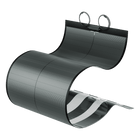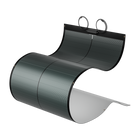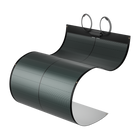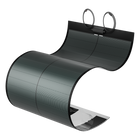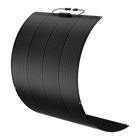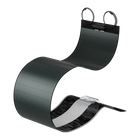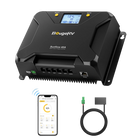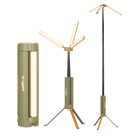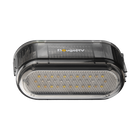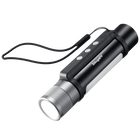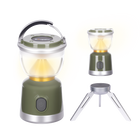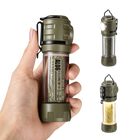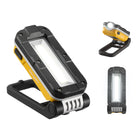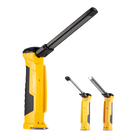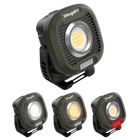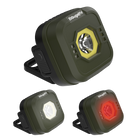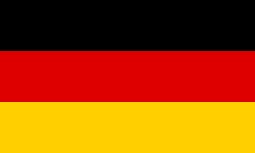The Best Solar Panels for Camping Based on Cost, Portability, and Power


There’s nothing like camping. It’s an opportunity to get out and explore the great outdoors while reconnecting with the people you care about most. But while many go camping to disconnect, you don’t necessarily want to be without essential electronics and appliances for your entire trip.
That’s where solar panels for camping come into play. They provide a convenient and cost-effective way to charge your favorite devices and power basic appliances while you’re on the road. The only question is which solar panels you should choose.
We created this guide to help with that. It covers the top solar panels for different types of campers, including each of the following:
- Best overall solar panels for camping: 200W CIGS flexible solar panels
- Best inexpensive solar panels: 100W mono solar panels
- Best foldable solar panels: 200W portable solar panels
- Best solar panels for backpacking: 100W portable solar blanket
- Best solar panels for maximizing surface area: Bifacial 200W solar panels
We take a closer look at the pros and cons of each of these products below to help you decide which is right for your next trip.
The Best Solar Panels for Camping
1. Best Overall Solar Panels for Camping: 200W CIGS Flexible Solar Panels
The 200W CIGS flexible solar panels are our top pick for the best camping solar panels overall thanks to their unique blend of flexibility and performance. You can connect them to any surface area thanks to BougeRV’s durable, any-weather adhesive, which comes included with your purchase.
You also get 360-degree flexibility. This makes the solar panel highly compact and portable, so you can easily bring it with you even when you’re packing light. With 200 watts of power, you’ll be able to charge all of your favorite electronics and even supply power to basic appliances like coffee makers, projectors, and camp stoves.
One other thing to note is that we also provide this flexible solar panel in 400-watt and 800-watt sizes. So if you’re interested in spending a little more money for more power, you can do that. Our CIGS solar products are designed to last for 25 years, so it may be worth the investment if you plan on camping a lot.
2. Best Inexpensive Solar Panels: 100W Mono Solar Panels
If you’re interested in charging personal electronic devices and other simple applications like powering lights, our 100W mono solar panels may be right for your needs. They’re highly affordable, with a price around $120. They’re also built to last in extreme weather, including harsh winds and snowstorms.
Another advantage is that these solar panels come with pre-drilled holes. That makes installation very straightforward and fast, without requiring any heavy tools in the process.
The drawback is that a 100W mono solar panel may not deliver enough energy to recharge all of your family’s electronics at once and may not be able to power larger camping appliances. But at this price point, it delivers more than enough energy to meet your basic camping power needs.
3. Best Foldable Solar Panels: 200W Portable Solar Panels
Foldable solar panels are useful for camping because they make it easier to pack light. Our 200W portable solar panels fold down to a size of just 21.9 inches by 22.5 inches but expand to cover 86.6 inches of surface area when you open them up. They also feature up to 45 degrees of angle adjustability, so you can always find the sun no matter where it sits in the sky.
There’s no installation process with our 200W portable solar panels, either. You can simply unfold the panels when you’re ready to use them and position them toward the sun. Getting the energy you want during your next camping trip could be as easy as that with this product.
4. Best Solar Panels for Backpacking: 100W Portable Solar Blankets
When backpacking, every inch of space and pound of weight matters. That’s what makes our PASO 100W CIGS portable solar blanket the perfect fit. It weighs under five pounds and rolls up into a tight blanket so you can easily fit it into your pack.
The CIGS portable solar blanket is also highly resistant to damage from bumps, rough handling, and the elements. This means you can stuff it into your pack and take it through whatever conditions your backpacking trip involves without having to worry about damaging it in the process.
5. Best Solar Panels for Maximizing Surface Area: Bifacial 200W Solar Panels
One of the challenges of solar energy is that the sun can change positions on a daily basis and even throughout different hours of the day. This means installed solar panels may not always capture the maximum amount of sun, which reduces the amount of power they can generate.
Our Bifacial 200W solar panels fix this. They’re capable of absorbing sunlight from both sides of the solar panel, instead of only one side. That can help you generate up to 30% more energy than standard solar panels.
These are ideal for installation on RV roofs, camper vans, and even camping cars. However, keep in mind that they weigh about 24 pounds and aren’t foldable. That makes them a better fit for stationary installations than things like backpacking trips.
Choosing the Right Solar Panels for Camping for Your Needs
We’ve covered our top five solar panels for different types of camping. But you may still have questions about which product is right for you. As you shop, considering the following factors will help you land on the best decision for your needs.
Your Solar Energy Needs
The first step in choosing a solar panel for camping is determining what you want to use the solar power to do. For example, are you just looking for something that can recharge basic electronics like phones and laptops? Or do you want to power more substantial applications like a camping stove or a small air conditioner?
Your answer to this question will determine the amount of solar energy that you need to achieve your goals. You can then use that figure to determine the size of solar panels you need to generate the amount of power you’re looking for.
As a general rule of thumb, solar panels that can generate more power cost more. So, you’ll need to balance the amount you’re willing to pay for solar energy while camping against the applications you want to use the solar energy to complete.
Your Camping Style
It’s also important to consider how you typically camp when choosing a solar panel for your next outdoor adventure. There are big differences between solar panels designed to be as lightweight and compact as possible and those that are built to be installed on surfaces like RV roofs.
For example, flexible solar blankets are ideal for backpacking because they’re so lightweight and compact. Foldable solar panels can also work for backpacking but are better for stationary campers who want to pack light. Then, you have Monocrystalline solar panels that are designed to be permanently installed on RV and camper surfaces, which are not flexible but may offer more power at a lower price point.
Understanding your camping style will help you choose a type of solar panel that’s ideal for your next trip. However, you may also want to consider how your camping preferences may evolve over time, as BougeRV’s solar panels are rated to last up to 25 years.
Your Budget
Your budget will also play a role in determining the solar camping solution that’s best for your needs. You can typically save money by purchasing a solar panel with a lower wattage rating or spend more by buying one that can generate more watts.
The question may become how much are you willing to pay to meet all of your energy needs while camping. Or is there some room for compromise? For example, you might need your personal electronics charged but only want to be able to run small appliances while camping. In that case, it could make sense to buy a solar panel with a lower energy rating to keep costs down.
The Duration of Your Trip
Finally, you may also want to consider how long your camping trips typically last when purchasing a solar panel for them. For example, if your camping trips last for weeks or more, it may be more important to find a solar energy solution that can power small appliances than it would be if you only camped for a few days at a time.
A Note on Portable Power Stations

One critical thing to keep in mind while shopping for solar panels for camping is that they can only generate power when the sun is out. That means they can’t address your energy needs at night unless you pair them with another solution.
Portable power stations are the solution for many campers. These are essentially portable, lightweight batteries that you can charge with your solar panels. Then, you can plug your appliances and devices into the portable power station whenever they need energy – even if the sun isn’t out when you want to use them.
That’s why most campers decide to pair their solar panels with a portable power station. It helps you get more value out of the panels and ensures that you always have the energy you need while camping at night.
If you’re interested in power stations, BougeRV carries many different sizes. Take a look at our portable power station page to learn more.
Find The Best Solar Panels For Your Next Camping Trip Now

The best solar panels for your next camping trip will come down to the type of camping you plan on doing and your energy needs. You can use this list as a starting point to evaluate your options and figure out where further research may be necessary to find the right fit for your goals. Hunting for more solar panels? Go to BougeRV’s affordable and quality solar panel collections now!
Solar Panels For Camping FAQs
1. Are solar panels worth it for camping?
Solar panels can absolutely be worth it for camping because they provide a reliable source of clean energy you can use to recharge electronics and power small appliances when no other sources of power are available. However, you may or may not find that benefit valuable enough to purchase solar panels for camping.
2. How much do solar panels for camping cost?
You can buy solar panels for camping for as little as $100 or more than $1,000. It depends on the type of solar panels you want to purchase and the amount of power they can generate. More power typically means a higher price, whereas you can keep costs low by purchasing something smaller.
3. What size solar panel should I bring camping?
Most campers bring between 100W and 200W solar panels with them, but your needs may vary. If you want to power more substantial appliances, you may need more than 200W of energy to do so. But for simple device charging, 100W or less can suffice.
















